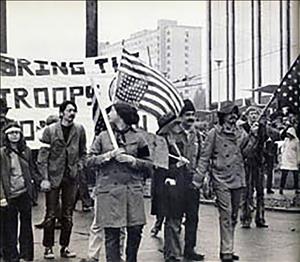On August 7, 1964, Congress passes the Gulf of Tonkin Resolution marking the active involvement of the U.S. in the Vietnam War. The resolution approves retaliatory air raids against North Vietnam and allows the President to take all necessary measures to repel any armed attack against U.S. forces and to prevent further aggression in Vietnam. The act serves as the constitutional basis for the escalation of military activity in the region for the next 11 years. Johnson assures Congress, "As I have repeatedly made clear, the United States intends no rashness, and seeks no wider war" (Library of Congress). Johnson would later remark that the resolution was, "like grandma's nightshirt -- it covered everything" (Karnow).
Since 1959, U.S. Forces had been in South Vietnam assisting the government there in its battle against the Viet Cong, an insurgent Communist force supported by Communist North Vietnam. American servicemen had been killed, but after two U.S. destroyers were allegedly attacked by North Vietnamese torpedo boats, President Johnson ordered air raids against North Vietnam. He asked Congress for authority to continue to respond. The vote was almost unanimous. Two Senators, Wayne Morse (D. Oregon) and Ernest Gruening (D. Alaska) voted no. Morse stated, "I believe that within the next century, future generations will look with dismay and great disappointment upon a Congress which is now about to make such a historic mistake" (Congressional Record).
Unlike prior conflicts, the war expanded gradually. Eventually, more than eight million U.S. military personnel would serve and fighting would spread from North and South Vietnam to Laos and Cambodia.
Seattle did not see a boom as it had in prior wars. Although the Port of Seattle saw materiel shipped overseas, the Port of Embarkation at Pier 91 was declared surplus property. Fort Lawton and Sand Point Naval Air Station were also closed during this war. In the 1960s, troops traveled overseas in jetliners instead of aboard troop ships.
Seattle did see its share of protest against the war, which took the form of rallies, marches, and in extreme cases, bombings. In 1971, Seattle was second in the nation in bombings.
More than 58,000 Americans died over a 17-year period. The Vietnamese deaths were estimated at more than 2.1 million. The Roll of Honor for Washington State lists 1,122 names of those who died in the war.
Four men from King County were awarded Medals of Honor for gallantry in combat. Army PFC Lewis Albanese (posthumously), Army Major Patrick Henry Brady, Army Specialist Four Thomas James Kinsman (posthumously), and Army Second Lieutenant Robert Ronald Leisy (posthumously) received the Nation's highest honor for heroism.

